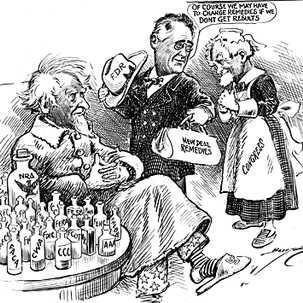Historical Context
Development of the New Deal
Signing of the FLSA
Short Term Impact
Long Term Impact
Written Work
"I say that while primary responsibility for relief rests with localities now, as ever, yet the Federal Government has always had and still has a continuing responsibility for the broader public welfare. It will soon fulfill that responsibility."
- Franklin D Roosevelt, quoted from his speech at the Democrat National Convention in Chicago, 1932
The Fair Labor Standards Act was part of a larger program known as the New Deal, a collection of acts established by President Franklin D. Roosevelt created to fight back against the ongoing Great Depression in the United States and prevent future economic disasters from crippling America. The New Deal was the change Roosevelt promised to make to end the suffering of Americans and the U.S. economy; the change former President Hoover never brought.
"I pledge you, I pledge myself, to a new deal for the American people."
- Franklin D. Roosevelt, quoted from his speech at the Democrat National Convention in Chicago, 1932

New Deal Remedies, c. 1934, First Amendment Museum
“I wish you could do something to help us girls....We have been working in a sewing factory,… and up to a few months ago we were getting our minimum pay of $11… Today the 200 of us girls have been cut down to $4 and $5 and $6 a week.”
- (Letter, Young Worker)

President Franklin D. Roosevelt signing the Wagner Act
The Wagner Act is Signed, c. 1935, AARegistry
The New Deal included other acts prior to the FLSA, including the National Industrial Recovery Act of 1933 and the National Labor Relations (Wagner) Act. They were created to serve a similar general purpose as the FLSA, and paved the way for its final draft.
- Franklin D. Roosevelt, Fireside Chat on Works Relief Programs, April 28th 1935
“It seems to me to be equally plain that no business which depends for existence on paying less than living wages to its workers has any right to continue in this country. By "business" I mean the whole of commerce as well as the whole of industry; by workers I mean all workers, the white collar class as well as the men in overalls; and by living wages I mean more than a bare subsistence level-I mean the wages of decent living.”
- Franklin D. Roosevelt, quoted from his statement on the National Industrial Recovery Act, 1933